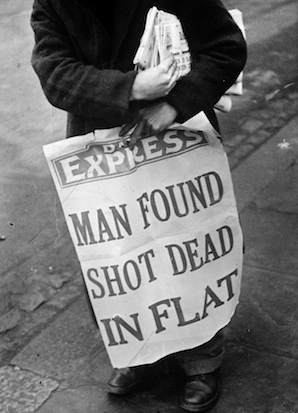Anthony Quinn’s fourth novel, set in London’s artistic and theatrical circles in 1936, is not the kind in which an anguished protagonist sits in lonely contemplation for 80 pages at a stretch. It moves along at a clippy pace, introducing us to a succession of appealing characters and throwing in a lurid murder for extra oomph. But despite its wealth of detail — the lino-clad corridors and ‘mournful furniture’ of a Marylebone boarding-house, lamplighters doing their rounds, actresses wearing Guerlain’s Jicky — it is more substantial than a period romp. As the ‘Tiepin Killer’ — so-called because he pierces the tongues of his victims with a tiepin once he’s strangled them — both terrorises and fascinates London, there are other horrors to contemplate. British fascism is on the march (Oswald Mosley hovers offstage and Lord Haw-Haw makes a deeply unpleasant appearance), women are forced into prostitution by unscrupulous pimps and homosexuals live in precarious concealment.
Chief among the latter is Jimmy Erskine, a fat, boozy theatre critic who’s pushing 60, but, as one onlooker points out, immaturing with age. There is a cheerful nostalgia to the descriptions of his rackety life — partly based on that of the critic James Agate. Freelance journalists habituated to scrabbling around in a packet of cereal for sustenance will feel envious of the sparkling hock and cold partridge that Jimmy fetches himself to fuel a late-night copy deadline. His idea of economising is to buy a Bentley to save on cab fares, and he retains a secretary, the long suffering Tom Tunner, to drive him around and to attend to all the other boring bits of his life. On one occasion, he dashes off ‘an amusing little squib’ entitled ‘Who Reads Film Criticism?’ (Quinn was for many years the film critic of the Independent), and rewards himself with a plate of oysters and a half-bottle of Muscadet (another concession to austerity) that goes down ‘quicker than a homesick mole’. This is very much the vision of Grub Street likely to appeal to prospective readers.
In fact, Jimmy’s oysters are a prelude to a mugging-cum-homophobic-roughing-up. His life is not all jammy: his enthusiasm for the company of guardsmen must be concealed from his moralising employers at the Chronicle and, more existentially, his facility and discernment — he produces around half a million words a year, not bad for someone so frequently sloshed — mean that he’s begun to bore himself: ‘He loved the way his prose fell into place. He was also rather sick of it.’
Quinn brings to life Jimmy’s world, and that of actress Nina Land, society portraitist Stephen Wyley and intelligent, impoverished Madeleine Farewell, a girl on the run from an awful aunt in Chertsey, with great aplomb — so much so that the hunt for the Tiepin Killer feels somewhat underpowered. The greater achievement lies in the accomplished way he weaves together a number of apparently disparate personal narratives, all linked by their need for a secrecy that now seems painfully pointless.
Available from the Spectator Bookshop, £11.69 Tel: 08430 600033






Comments